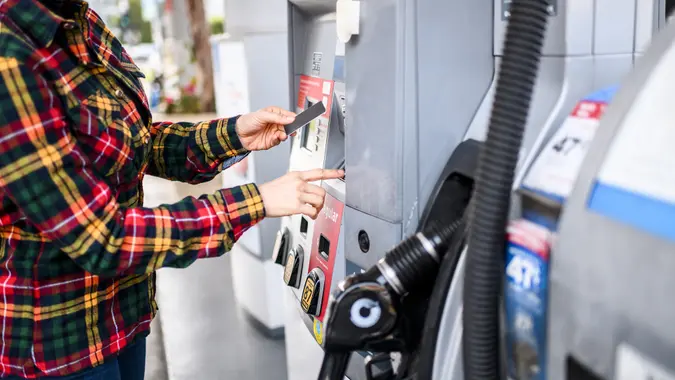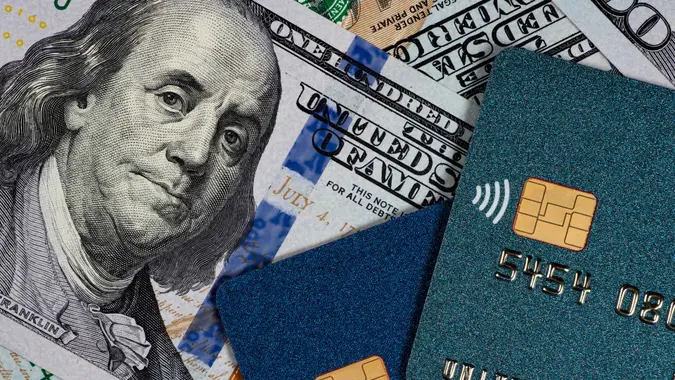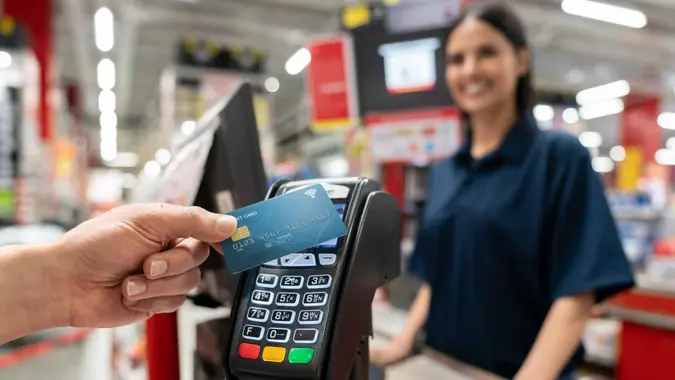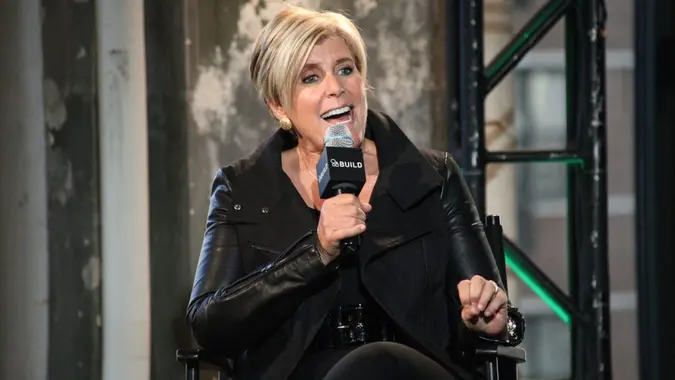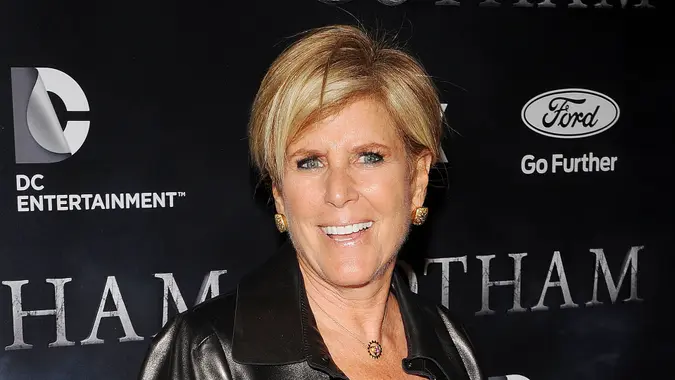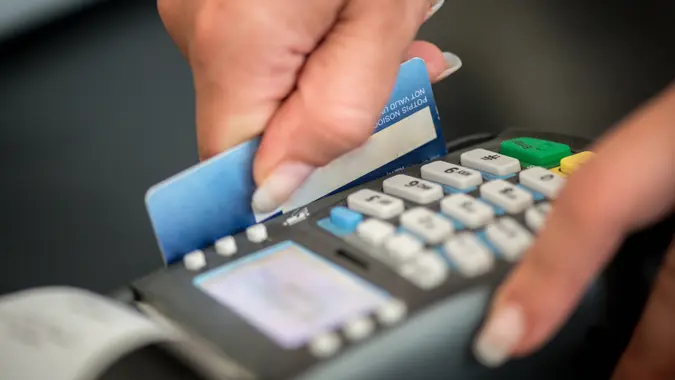Which Is Smarter: ‘Buy Now, Pay Later’ or Credit Cards?

Commitment to Our Readers
GOBankingRates' editorial team is committed to bringing you unbiased reviews and information. We use data-driven methodologies to evaluate financial products and services - our reviews and ratings are not influenced by advertisers. You can read more about our editorial guidelines and our products and services review methodology.

20 Years
Helping You Live Richer

Reviewed
by Experts

Trusted by
Millions of Readers
When you need to purchase something but don’t have the funds right at that moment, most people turn to their credit cards, hoping they can pay off a big purchase with the next paycheck or several. But not everyone qualifies for a credit card or wants to use one. Retailers have started to get smart and find new ways to help people purchase items when they don’t have the funds: Buy Now, Pay Later (BNPL) programs.
“BNPL apps such as Klarna and Affirm offer customers the ability to split their purchases between four interest free payments,” said Tionna Hicks, a certified financial education instructor and founder of The Honest Plan.
More plainly put, “Both BNPL and credit cards are forms of loans or credit whereby you don’t pay anything now but will be charged monthly until the debt is paid off,” said Scott Nelson, CEO of MoneyNerd Ltd.
So which option makes the most sense for a consumer? It’s not as simple as saying one or the other. Here, we break down some of the benefits and drawbacks of each.
BNPL’s Biggest Pros
Where BNPL excels over credit cards is in your ability to pay over time without accruing interest, said Julie Ramhold, a consumer analyst with DealNews.com. “Most of the companies use a ‘pay in four’ model where shoppers make the first payment at the time of purchase and then spend the next six weeks making the other three payments.” She points out that a typical credit card will start charging you interest after only four weeks.
Flexibility is a key benefit of BNPL. “Get your items now rather than having to wait,” Ramhold said.
You also can choose how much to pay at each installment, typically without a set minimum payment.
BNPL Doesn’t Require a Credit Check
“BNPL options are often available to those who do not qualify for a credit card but can vary greatly in terms of interest rates and loan terms,” said Jake Hill, CEO of DebtHammer. Most BNPL programs don’t even run a credit check on those who apply (though some do, and others do what’s called a “soft check” that doesn’t affect your credit score).
In fact, BNPL can be considered less risky than a credit card, according to Dror Zaifman, director of digital marketing at iCASH. “When someone misses a payment on a credit card, the consumer is charged interest and can be reported to collections by the creditor if still unpaid after 60 days. BNPL programs only charge the user if they fail to make a payment on time.” They may refer to that as a late fee.
Zaifman said that BNPL programs may be better for smaller purchases, however, because you have a better likelihood of paying a small amount off.
“Before choosing between the two, consumers need to determine if they can pay off the balance of the BNPL option by the due date,” said Bob Castaneda, program director in Walden University’s College of Management and Technology, “If not, this loan has harsh penalties of retroactive interest rates. There’s no such thing as a free lunch, so consumers need to shop for the best payment option, while factoring in interest rates and lender’s fees, prior to making a purchase.”
Retroactive interest means that, if you don’t make one of your payments, or are extremely late, they can charge interest that dates back to the beginning of the loan, not the most recent payment, according to ResearchFDI.com.
BNPL Downsides
BNPL usually only applies to a single purchase from a single merchant, said Lee Grant, CEO at Wrangu. So, if you’re trying to buy multiple items from multiple retailers with this method, you may find yourself out of luck.
Additionally, though many BNPL programs don’t charge interest or fees, some do. “Longer-term loans from BNPL, which can last up to 48 months, have an interest rate similar to that of a standard personal loan,” Grant said. “Unlike a loan or credit card, however, many BNPL providers do not check credit before approving customers, making financing more accessible.”
And remember that not all retailers accept BNPL, so your shopping options may be limited, particularly for things like groceries and gas, Nelson said.
Credit Cards Can Offer Rewards
What BNPL cannot do that credit cards can is offer you rewards such as points and miles earned for every dollar spent, said Carol Tompkins, business development consultant at Accounts Portal.
“Credit cards will offer rewards such as travel insurance, purchase protection and others,” she said, as well as security against fraud.
Credit Cards Help You Earn Credit
The added benefit of credit cards is that they help to build your credit score, Tompkins said. BNPL doesn’t affect your credit score unless you don’t pay. “So, are you out for rewards or convenience?” she asked.
Credit Cards Are More Versatile
Credit cards offer greater versatility in what you can buy, where and how much of it, according to Hill. You can buy multiple items, you can pay different amounts each month on your bill, and you can buy from a vastly wider variety of retailers.
Credit Cards Charge Interest
Probably the biggest downsides of credit cards is that they charge a sizable amount of interest on balances that carry over to the next month. Also, you have to qualify for them based on your credit score and other variables, which can work against some shoppers.
It’s a Personal Choice
“Ultimately, the best option depends on the flexibility of the consumer and their ability to pay the entire balance of a buy now, pay later plan on time. Otherwise, they should pay with a credit card,” Castaneda said.
More From GOBankingRates
 Written by
Written by  Edited by
Edited by 




